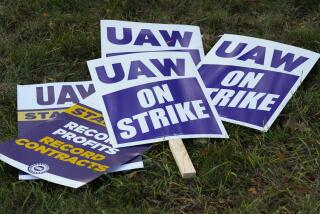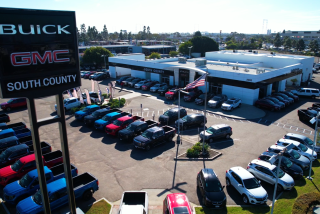Companies Unfazed by Changes Rocking Brazil
- Share via
SAO PAULO, Brazil — Brazil’s economic turmoil last month caused Chrysler regional manager Dennis Kelly to stop and reconsider the auto maker’s plans to build a $315-million factory here--for “less than four seconds.”
Despite the turbulence in Brazil’s financial markets, a run on the currency and an austerity program that is already causing economic hardship and labor unrest, Chrysler is forging ahead with its giant truck assembly plant in Parana state north of here.
“It was never an option to stop. That plant is set in stone,” said Kelly, whose company will make 40,000 Dodge Dakota pickup trucks a year at the Campo Largo factory starting in June. Although he knows the market for his vehicles will shrink next year, Kelly is adamant: “We believe in Brazil.”
Indeed, the vast majority of U.S. and other foreign companies setting up operations here--and there are hundreds of them--appear as gung-ho as Chrysler, apparently convinced that the economic measures taken by President Fernando Henrique Cardoso are the harsh but necessary prescription for continued growth and that the recession those measures are likely to produce will be brief.
An Arthur Andersen survey of 500 companies released Thursday shows that despite the November shock waves and the instability that is likely to linger, 89% of domestic companies and 94% of foreign firms say they will continue to invest in Brazil in 1998. And the investments are significant, averaging nearly one-quarter of the companies’ Brazilian net worth.
The risks are palpable. Cardoso’s austerity plan sent interest rates soaring, triggering a 32% plunge in Brazilian car sales last month. All auto makers here promptly scaled back production, and some ordered layoffs. Although unions representing 190,000 auto parts workers agreed to a reduced workweek and a 10% jobs cut last week, workers at Volkswagen rejected a similar plan. On Thursday, about 10,000 workers marched in a Sao Paulo suburb to protest Ford Motor Co.’s plans to lay off as many as 1,200 workers.
But foreign investment will keep flowing for the simple reason that Brazil is too important to walk away from. The country, almost overnight, has become one of the largest and fastest-growing consumer markets in the world.
Since Cardoso’s “Real Plan” took effect in 1994, a stable currency and easier credit have unleashed consumers in a place where hyper-inflation previously had all but snuffed out their acquisitiveness. Economic growth has averaged between 3% and 6% over the last four years, and executives have faith that growth will continue, despite a recession that could last most of 1998, the Andersen survey found.
“The general feeling is that although we were facing a crisis, it was not generated locally. We will have two to four months ahead that will be kind of hard, but this will bring a benefit of increased stability,” said Rubens Branco, an Andersen partner in Rio de Janeiro.
*
Until recent years, stability has been a foreign concept in Brazil. As recently as 1993, inflation topped 3,000% per year, which meant most Brazilians didn’t bother to save for big purchases, but rather spent their paychecks as quickly as possible while they were still worth something, said Peter Stern, international trade manager at the American Chamber of Commerce in Sao Paulo.
“The first of every month, you’d see lines snaking around the supermarkets. The joke was that if you saw a coin on the street, you didn’t bother picking it up because in the time it took to bend down and get it, it had lost its value,” Stern said.
Now that prospects have improved for long-term economic growth and low inflation, Brazil, with its 160 million population, is being inundated by U.S. manufacturers, ranging from auto makers such as Chrysler to soft goods firms such as Procter & Gamble, Eastman Kodak and the makers of Gatorade. They’re also coming from France, Germany, Japan and South Korea, investing $15 billion in the nation this year. That makes Brazil the second-largest recipient of direct foreign investment after China.
The companies have their eye on Brazilian consumers, who have become insatiable buyers of all manner of goods. From 1994 to 1996, their purchases of refrigerators grew 68%, televisions 71% and microwaves 140%. Beer sales were up 55%, yogurt 87% and chicken 28%, according to IPEA, a government economic research and planning agency.
But most mind-boggling in terms of sheer economic impact was the growth in Brazilian auto sales.
Vehicles sold in Brazil last year totaled 1.5 million, or double the 740,000 cars and trucks sold just four years earlier. And because of the country’s increasing role as a base for exports, Brazil’s auto production is flashing even bigger numbers, reaching 1.8 million units last year--up 80% from the 1 million that rolled off the assembly lines in 1992.
No wonder car makers are flocking here. Over the next two years, Brazil’s current Big Four--General Motors, Ford, Volkswagen and Fiat, the manufacturers that have long dominated car sales here--will become the Big Eight as Chrysler, Peugeot, Renault and Honda open major plants. Joint ventures of BMW-Rover and Volkswagen-Audi will open smaller plants as well. Production is expected to increase by an additional 50% to 3 million units by 2000.
*
Chrysler’s Kelly said Brazil’s best growth years in terms of auto sales may lie ahead because car ownership density in Brazil is still relatively thin. There is currently one vehicle for every nine people here, compared with one car for every 1.5 people in the U.S.
Chrysler is reentering Brazil as a manufacturer after having made a reluctant departure in 1980. It sold its Sao Paulo plant, and all of its other foreign factories, as a condition of a U.S. government bailout that saved it from collapse.
Chrysler made a tentative return to Brazil in 1993, by exporting cars and selling through distributors. Then in 1996, it committed to a manufacturing plant after agreeing to the Brazilian government’s three main conditions: that 60% of a car’s value would someday originate from Brazilian suppliers, that a significant portion of its output would be exported to help Brazil’s balance of trade, and that it would invest heavily in technology.
“It’s a first step, based on what we hope it can become,” Kelly said of the plant, which will employ 800.
As the biggest and most visible newcomers, foreign auto companies are attracting all the attention here. And they are receiving the most lucrative inducements from the various regions in Brazil that are vying for them. The most successful state so far is Parana, north of Sao Paulo state, where Chrysler, Renault and Volkswagen-Audi have all committed to build factories. A Chrysler-BMW venture is also expected to put an engine plant in Parana, possibly adjacent to Chrysler’s site.
In fact, Parana’s capital of Curitiba will metamorphose from cow town to Motown as the major plants open over the next two years. As a lure, Parana has offered auto companies a four-year deferment on state taxes, which can amount to as much as 17% of gross revenue. Clemente Simiao, an attorney attached to the state’s Department of Industry and Commerce, said the inducements are worth it for the jobs and technology the auto companies bring.
“Parana used to be only an agricultural state, and we were always subjected to fluctuations of good and bad harvests. So we wanted to diversify our economy and also give our youths the opportunity to be trained in the high technology of the world,” Simiao said.
*
Auto makers are especially attractive to developing nations because they typically bring suppliers--and more jobs and technology--with them. Among the biggest in this second wave of companies coming to Parana state is Detroit Diesel Corp., which last month opened a highly automated Curitiba plant and is already shipping finished engines to Chrysler in the U.S.
The company has been able to draw on a sophisticated work force idled by the decline of nearby woodworking and textile industries. The engine plant employs 50.
“The labor pool is very similar to what you would find in a highly developed country. You aren’t trying to pioneer here,” said Marc Forest, general director of Detroit Diesel’s Brazilian operation.
Although it started as purely an assembly shop of components brought in from the U.S., the Detroit Diesel plant next year will start “earning its keep” in the eyes of Brazilians by buying crankshafts and engine casings made by Brazilian suppliers.
Even optimists like Kelly are keeping a wary eye on Brazil’s economy. He knows that the auto market here cannot sustain continued interest rates of 40%, which is where Cardoso raised them Oct. 31 to fight off currency speculators. The rates and the austerity plan, with its tax increases and job cuts, will slow Brazil’s economic growth to a near-halt in 1998, economists expect.
Amaury de Souza, a political scientist with the IDESP think tank in Sao Paulo, said Brazil, its consumers and its recently arrived manufacturers and merchants are still subject to currents beyond their control.
“The general feeling is that Cardoso did the right thing, that the economic fundamentals are now sound. But if Southeast Asian problems continue and South Korea can’t get a handle on its fiscal crisis, we are in for a very rough ride,” De Souza said.






